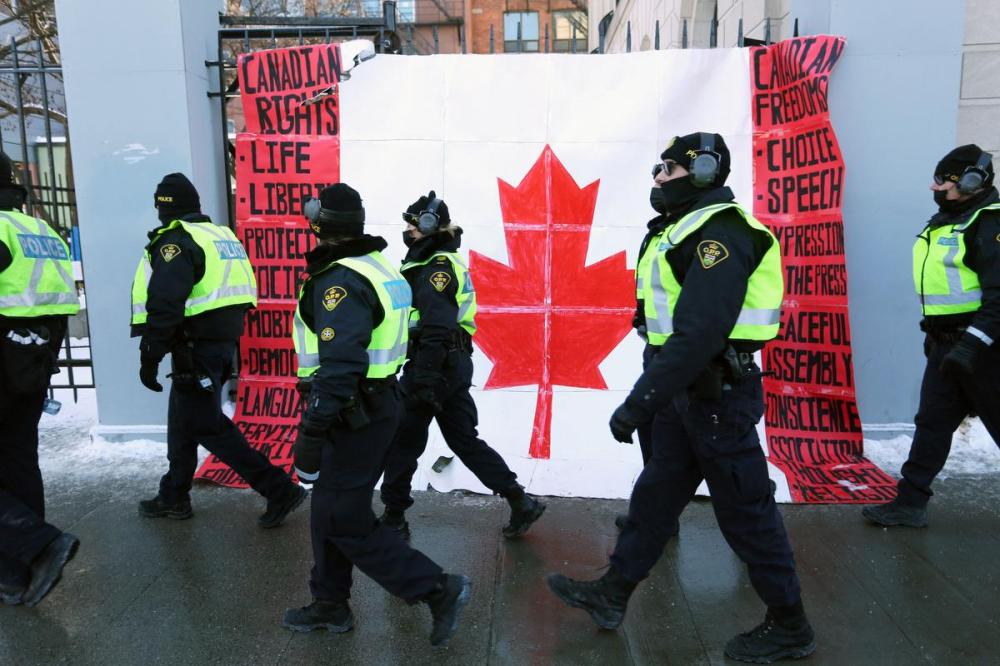‘Freedom convoy’ fundraising: No rise in suspicious transaction reports due to protests, financial watchdog says
Advertisement
Read this article for free:
or
Already have an account? Log in here »
To continue reading, please subscribe:
Monthly Digital Subscription
$0 for the first 4 weeks*
- Enjoy unlimited reading on winnipegfreepress.com
- Read the E-Edition, our digital replica newspaper
- Access News Break, our award-winning app
- Play interactive puzzles
*No charge for 4 weeks then price increases to the regular rate of $19.00 plus GST every four weeks. Offer available to new and qualified returning subscribers only. Cancel any time.
Monthly Digital Subscription
$4.75/week*
- Enjoy unlimited reading on winnipegfreepress.com
- Read the E-Edition, our digital replica newspaper
- Access News Break, our award-winning app
- Play interactive puzzles
*Billed as $19 plus GST every four weeks. Cancel any time.
To continue reading, please subscribe:
Add Free Press access to your Brandon Sun subscription for only an additional
$1 for the first 4 weeks*
*Your next subscription payment will increase by $1.00 and you will be charged $16.99 plus GST for four weeks. After four weeks, your payment will increase to $23.99 plus GST every four weeks.
Read unlimited articles for free today:
or
Already have an account? Log in here »
Hey there, time traveller!
This article was published 10/02/2022 (1400 days ago), so information in it may no longer be current.
Fundraising for Canada’s “Freedom Convoy” has not been linked to any spike in suspicious financial transactions, this country’s money-industry watchdog has testified.
The deputy director of Fintrac testified Thursday as the National Security Committee probed violent extremism and those funding it, against a backdrop of protests unfolding across the country against vaccine mandates and health restrictions.
Barry MacKillop, deputy director of Fintrac responsible for tactical intelligence and targeted strategic intelligence, said the agency has partnerships with banks, money-transfer companies and foreign watchdogs that would allow it to detect potential suspicious activity stemming from fundraising on platforms such as GoFundMe and GiveSendGo, both of which have been used to raise money for the protesters.

But, he said, the agency hasn’t seen an uptick in reports that meet its thresholds for alerting law-enforcement agencies of potential money laundering or terrorism schemes.
“We have not seen a spike in suspicious-transaction reporting related to this,” MacKillop said. “What we’re going through right now is a unique event.”
He said Fintrac has typically not viewed online fundraising platforms as a place used to facilitate money laundering or funding terrorism.
Fintrac is an arm’s-length agency reporting to the finance minister and tasked with ensuring public compliance with Canada’s laws to prevent money-laundering and financing of terrorism.
Among the data the centre collects are financial transaction reports and information taken directly from the public.
The National Security Committee agreed last Thursday to invite representatives from GoFundMe to speak about the more than $10 million raised for the Freedom Convoy through its platform, as part of a study into potential foreign interference in the “Freedom Convoy” that has been occupying Ottawa for more than two weeks.
GoFundMe cancelled the fundraiser last Friday, citing evidence from Ottawa police that the cause had become an “occupation” rather than a peaceful protest. It’s reimbursing all donations to the fund, and is still invited to appear before the national security committee.
On Thursday, Liberal Taleeb Noormohamed moved to expand the scope of the committee’s study to include not only the rise of ideologically motivated violent extremism in Canada and the influence of foreign and domestic actors in funding it, but to interview representatives from GiveSendGo, Paypal and Stripe, as well as Canada’s national security organizations and police.
GiveSendGo is the Christian fundraising site that quickly became the alternative fundraising platform for the convoy after the GoFundMe page was cancelled. Another fundraiser was launched on the Bitcoin fundraising site TallyCoin, but it was not named in Noormohamed’s motion.
MacKillop was asked Thursday by Liberal committee members about whether he felt there were any policy gaps that could be plugged to help the agency track down potentially nefarious money transactions taking place on fundraising sites such as GoFundMe and GiveSendGo.
MacKillop responded that, although fundraising websites are not required to report potentially suspicious donations directly to agencies such as Fintrac or the equivalent in the United States, these donations are not truly hidden from oversight because they “intersect” with other types of companies that do have reporting requirements.
That includes money-transfer applications, such as Stripe and Paypal, which process donations, and banks, which see the donations when they are deposited.
He said the agency is always looking for ways to improve their methods of oversight, and other sectors that might be included in their reporting.
“We really have to find a balance between what could be imposed as a burden and the intelligence that could be received,” he said.
Sectors that Fintrac is looking at including in its regime include online fundraising and digital currencies.
With a file from Jeremy Nuttall

